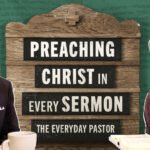The following 20 quotes caught my attention as I read Jen Wilkin’s superb new book, In His Image: 10 Ways God Calls Us to Reflect His Character (Crossway, 2018). (This is the sequel to None Like Him, a 2016 TGC Book Award winner.) Also check out Melissa Kruger’s sneak-peek interview with Wilkin.
If we want our lives to align with God’s will, we will need to ask a better question than “What should I do?” . . . God is always more concerned with the decision-maker than he is with the decision itself. (12)
If we focus on our actions without addressing our hearts, we may end up merely as better behaved lovers of self. (13)
No other attribute is joined to the name of God with greater frequency than holiness. (23)
If the utter purity of God makes the angels avert their gaze, preaching holiness may not be a crowd pleaser. Better to go with an emphasis on love so everyone feels welcome, or better to go with an emphasis on justice so everyone behaves. God deserves our worship for both his love and his justice. But his love and his justice are imbued with and defined by his holiness—he does not merely love; he loves out of utter purity of character. He does not merely act justly; he acts justly out of utter purity of character. If we emphasize any of his attributes above or apart from his holiness, we fashion him after our own imagining or for our own ends. His love becomes love on human terms, rather than a holy love. His justice becomes justice on human terms, rather than a holy justice. (25)
Simply put, God’s will for your life is that you be holy. That you live a life of set-apartness. That, by the power of the Holy Spirit, you strive for utter purity of character (Heb. 12:14). Every admonition contained in all of Scripture can be reduced to this. Every warning, every law, every encouragement bows to this overarching purpose. Every story of every figure in every corner of every book of the Bible is chanting this call. Be holy, for he is holy. (27)
According to Jesus, every call to obey hangs on the foundational command to love God and others. Any righteousness not firmly hung on love is filthiness and rags, just so many sodden garments on the floor of a flooded closet. (37)
A deficit in our love of neighbor always points to a deficit in our love of God. We must first focus on loving God rightly. Restoring the vertical relationship is the first step to righting the horizontal relationship. (38)
God’s goodness is a light that radiates through all his other attributes. It is the reason his omnipotence (possession of all power), omniscience (possession of all knowledge), and sovereignty (possession of all control) are a comfort instead of a terror. (48)
The Scriptures find the justice of God a virtue to be extolled, not a blemish to be concealed. (58)
Though in human terms, justice is portrayed as blind, the justice of God is wide-eyed and clear-sighted. . . . Not only is he the Judge, he is also the eyewitness who testifies to the facts—perfectly clear-sighted in his recollections. . . . There is no such thing as a secret sin. (59, 62)
Because of Christ, our Father and Judge does not look upon us with wrath, but he still parents us with justice. . . . God’s discipline is his justice without wrath. (63, 64)
While I can identify with the desire to edit God’s wrath from the Bible, or to contain it to the Old Testament, to do so would compromise his holiness and my posture before it. There is no way to reach genuine repentance without striving to grasp the justice of God’s wrath. As long as I view his wrath as excessive or cruel, I labor under a limited understanding of the danger and depravity of sin. And I labor under a limited understanding of Calvary. (65)
The immediate effect of apprehending God’s justice will be an inward-facing desire to obey. The long-term effect will be an outward-facing desire to do justice for others. (68)
God’s mercy is his active compassion toward his creation. . . . Though many conceive of the God of the Old Testament as a God of towering justice, absent of mercy, the Old Testament mentions his mercy more than four times as often as the New. (73)
The Bible is our great Ebenezer, a memorial stone to the faithfulness of God, carefully recorded and preserved for his children. . . . And every copy, from the dog-eared to the disregarded, is whispering, “Remember.” Remember the God who remembers you. (100, 101)
The church must be a bastion of patience. As the rest of the world chases the next new thing every eight seconds or less, we must be those who turn our eyes toward the long view. We must be known for our staying power when loving our neighbors takes longer than we expected and is harder than we thought. It takes patience to run with endurance, but that is the race the world needs to see us run. It may just be what catches and holds their attention in a goldfish world. Let patience be found among the people of God. He is not finished with us yet. (118)
It is not new truths we need; we need old truths recently forgotten. (129)
Often, we pray for wisdom when, in fact, we are seeking knowledge. Tell me what to do, Lord. Tell me which commitment to accept, what words to say, where to live, and who to work for. We may even remind God that in James 1:5 he told us we would receive wisdom if we asked. But we are not asking for understanding; we are asking for information. And in doing so, we betray our unwillingness to move from immaturity to maturity as a disciple. (142)
The most basic act of wisdom is repentance. (144)
It is not coincidental that a lack of discernment and a neglected Bible are so often found in company. (144)
Everything we say or do will either illuminate or obscure the character of God. Sanctification is the process of joyfully growing luminous. (153)
Previously in the “20 Quotes” series:
- Trevor Laurence, The Story of the Word (Wipf and Stock, 2017)
- Jonathan Leeman, How the Nations Rage (Thomas Nelson, 2018)
- Andy Johnson, Missions (Crossway, 2017)
- Alan Jacobs, How to Think (Currency, 2017)
- Tony Reinke, 12 Ways Your Phone Is Changing You (Crossway, 2017)
- Erik Raymond, Chasing Contentment (Crossway, 2017)
- Sinclair Ferguson, Devoted to God (Banner of Truth, 2016)
- Tim Keller, Hidden Christmas (Viking, 2016)
- Scott Sauls, Befriend (Tyndale House, 2016)
- Ray Ortlund, Marriage and the Mystery of the Gospel (Crossway, 2016)
- Jen Wilkin, None Like Him (Crossway, 2016)
- Tim Keller, Making Sense of God (Viking, 2016)
- Mark Dever, Understanding the Great Commission (B&H, 2016)
- Sinclair Ferguson, The Whole Christ (Crossway, 2016)
- Albert Mohler, We Cannot Be Silent (Thomas Nelson, 2015)
- Mark Dever and Jamie Dunlop, The Compelling Community (Crossway, 2015)
- Russell Moore, Onward (B&H, 2015)
- Rosaria Butterfield, Openness Unhindered (Crown & Covenant, 2015)
- Tim Keller, Preaching (Viking, 2015)
- Tim Keller, Prayer (Dutton, 2014)
- Kevin DeYoung, Taking God at His Word (Crossway, 2014)
It’s not too late to register for next week’s 2018 TGC Women’s Conference, June 16 to 18 in Indianapolis! Come hear Jen Wilkin and others teach from God’s Word. Browse the list of 56 speakers, 51 talks, and 14 “listening in” discussions. Register today!
Involved in Women’s Ministry? Add This to Your Discipleship Tool Kit.
 We need one another. Yet we don’t always know how to develop deep relationships to help us grow in the Christian life. Younger believers benefit from the guidance and wisdom of more mature saints as their faith deepens. But too often, potential mentors lack clarity and training on how to engage in discipling those they can influence.
We need one another. Yet we don’t always know how to develop deep relationships to help us grow in the Christian life. Younger believers benefit from the guidance and wisdom of more mature saints as their faith deepens. But too often, potential mentors lack clarity and training on how to engage in discipling those they can influence.
Whether you’re longing to find a spiritual mentor or hoping to serve as a guide for someone else, we have a FREE resource to encourage and equip you. In Growing Together: Taking Mentoring Beyond Small Talk and Prayer Requests, Melissa Kruger, TGC’s vice president of discipleship programming, offers encouraging lessons to guide conversations that promote spiritual growth in both the mentee and mentor.

































